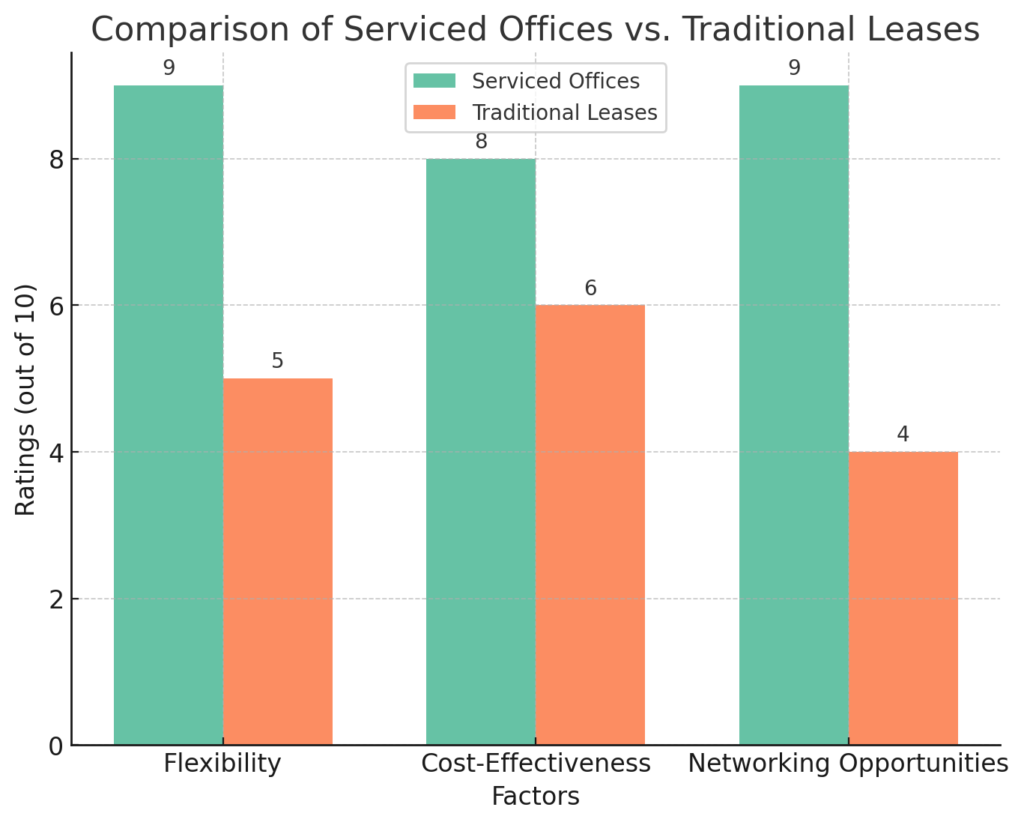Serviced offices have become an increasingly popular choice for modern businesses, offering flexibility, cost efficiency, and a ready-to-use workspace. But what businesses are best suited for serviced offices? This question is crucial for entrepreneurs, SMEs, and even large corporations looking to optimise their operational efficiency. Below, we explore the specific business types and stages that align well with serviced office spaces.
Start-ups and Entrepreneurs
For start-ups and entrepreneurs, flexibility is key. With uncertain growth trajectories, committing to a long-term lease can be financially risky. Serviced offices provide start-ups with:
- Short-term contracts, allowing businesses to scale up or down as needed.
- Minimal upfront investment, eliminating the need for costly office setup and maintenance.
- Networking opportunities, as many serviced offices house diverse businesses in a shared space.
A serviced office enables start-ups to focus on business development without worrying about administrative burdens, making them an ideal choice for early-stage companies.
Graph: Key Benefits of Serviced Offices for Start-ups

SMEs and Growing Businesses
As businesses grow, they require more resources, employees, and space. SMEs benefit from serviced offices in several ways:
- Scalability – Businesses can expand their workspace as they grow without the constraints of rigid lease agreements.
- Access to Premium Locations – Many serviced offices are in prime business districts, allowing SMEs to establish credibility without high overhead costs.
- All-Inclusive Services – Cleaning, IT support, and administrative staff are included, reducing operational hassle.
Serviced offices provide SMEs with an agile solution to accommodate growth without the heavy financial commitment of a traditional lease.
Remote Teams and Freelancers
Remote work is now a dominant trend, but not all professionals can work from home efficiently. Serviced offices offer freelancers and remote teams:
- Professional workspaces – Ideal for meetings and client interactions.
- Flexible contracts – Enabling individuals to rent desks or office spaces on an as-needed basis.
- Collaborative environments – Helping remote workers stay engaged and connected.
Freelancers in industries like digital marketing, consulting, and creative services particularly benefit from a serviced office setup.
International Companies Expanding into New Markets
When multinational companies enter new markets, setting up a traditional office can be a lengthy and expensive process. Serviced offices allow international businesses to:
- Establish a local presence quickly without the bureaucratic hurdles of long-term leases.
- Test new markets without making significant financial commitments.
- Utilise existing infrastructure, including IT and administrative support.
This makes serviced offices an attractive option for companies testing the waters in new geographic regions.
Pie Chart: Reasons International Companies Choose Serviced Offices

Project-Based Teams and Temporary Offices
For businesses that require temporary workspaces for projects, serviced offices provide:
- Short-term rental agreements for project durations.
- Fully-equipped offices that reduce setup time.
- Meeting rooms and collaboration spaces tailored to team needs.
Industries such as construction, consulting, and event management often require temporary offices, making serviced workspaces a practical solution.
What Businesses are Best Suited for Serviced Offices? – Final Thoughts
So, what businesses are best suited for serviced offices? From start-ups and SMEs to freelancers and international corporations, serviced offices offer unmatched flexibility, cost-effectiveness, and convenience. They cater to companies at different stages, allowing them to focus on growth without the constraints of long-term leases. Whether a business is looking to scale, establish a presence in a new market, or provide a professional setting for remote workers, serviced offices present an ideal solution.

